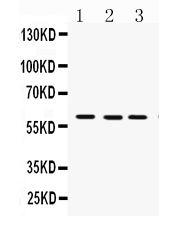Anti-FMO3 Picoband Antibody
- SPECIFICATION
- CITATIONS
- PROTOCOLS
- BACKGROUND

Application
| WB |
|---|---|
| Primary Accession | P31513 |
| Host | Rabbit |
| Reactivity | Human, Mouse, Rat |
| Clonality | Polyclonal |
| Format | Lyophilized |
| Description | Rabbit IgG polyclonal antibody for Dimethylaniline monooxygenase [N-oxide-forming] 3(FMO3) detection. Tested with WB in Human;Mouse;Rat. |
| Reconstitution | Add 0.2ml of distilled water will yield a concentration of 500ug/ml. |
| Gene ID | 2328 |
|---|---|
| Other Names | Dimethylaniline monooxygenase [N-oxide-forming] 3, 1.14.13.8, Dimethylaniline oxidase 3, FMO II, FMO form 2, Hepatic flavin-containing monooxygenase 3, FMO 3, Trimethylamine monooxygenase, 1.14.13.148, FMO3 |
| Calculated MW | 60033 MW KDa |
| Application Details | Western blot, 0.1-0.5 µg/ml, Human, Mouse, Rat |
| Subcellular Localization | Microsome membrane. Endoplasmic reticulum membrane. |
| Tissue Specificity | Liver. |
| Protein Name | Dimethylaniline monooxygenase [N-oxide-forming] 3 |
| Contents | Each vial contains 5mg BSA, 0.9mg NaCl, 0.2mg Na2HPO4, 0.05mg NaN3. |
| Immunogen | A synthetic peptide corresponding to a sequence at the C-terminus of human FMO3 (404-433aa DMMNDINEKMEKKRKWFGKSETIQTDYIVY), different from the related mouse sequence by eight amino acids, and from the related rat sequence by six amino acids. |
| Purification | Immunogen affinity purified. |
| Cross Reactivity | No cross reactivity with other proteins |
| Storage | At -20˚C for one year. After r˚Constitution, at 4˚C for one month. It˚Can also be aliquotted and stored frozen at -20˚C for a longer time.Avoid repeated freezing and thawing. |
| Sequence Similarities | Belongs to the FMO family. |
| Name | FMO3 |
|---|---|
| Function | Essential hepatic enzyme that catalyzes the oxygenation of a wide variety of nitrogen- and sulfur-containing compounds including drugs as well as dietary compounds (PubMed:10759686, PubMed:30381441, PubMed:32156684). Plays an important role in the metabolism of trimethylamine (TMA), via the production of trimethylamine N-oxide (TMAO) metabolite (PubMed:9776311). TMA is generated by the action of gut microbiota using dietary precursors such as choline, choline containing compounds, betaine or L-carnitine. By regulating TMAO concentration, FMO3 directly impacts both platelet responsiveness and rate of thrombus formation (PubMed:29981269). |
| Cellular Location | Microsome membrane {ECO:0000250|UniProtKB:P32417}; Single-pass membrane protein. Endoplasmic reticulum membrane {ECO:0000250|UniProtKB:P32417}; Single-pass membrane protein |
| Tissue Location | Liver. |

Thousands of laboratories across the world have published research that depended on the performance of antibodies from Abcepta to advance their research. Check out links to articles that cite our products in major peer-reviewed journals, organized by research category.
info@abcepta.com, and receive a free "I Love Antibodies" mug.
Provided below are standard protocols that you may find useful for product applications.
Background
FMO3 (Flavin-containing Monooxygenase 3) is an enzyme that in humans is encoded by the FMO3 gene. The mammalian flavin-containing monooxygenases (FMO) represent a multigene family whose gene products are localized in the endoplasmic reticulum of many tissues. The FMO3 gene contains 1 noncoding and 8 coding exons. And the FMO3 gene is mapped on 1q24.3. Using quantitative RNase protection assays, FMO3 is present in low abundance in fetal liver and lung and in adult kidney and lung, and in much greater abundance in adult liver. By Western blot analysis of human liver microsomal samples ranging from 8 weeks gestation to 18 years of age, FMO1 is the major fetal isoform and FMO3 is the major adult isoform. FMO3 was expressed at intermediate levels until 11 years of age when a gender-independent increase in FMO3 expression was observed during puberty. Sufferers of trimethylaminuria may display a reduced ability to metabolize substrates for FMO3 such as nicotine. FMO3 metabolizes a number of drugs, including amphetamine, clozapine, deprenyl, metamphetamine, tamoxifen, ethionamide, thiacetazone, and sulindac sulfide.
If you have used an Abcepta product and would like to share how it has performed, please click on the "Submit Review" button and provide the requested information. Our staff will examine and post your review and contact you if needed.
If you have any additional inquiries please email technical services at tech@abcepta.com.













 Foundational characteristics of cancer include proliferation, angiogenesis, migration, evasion of apoptosis, and cellular immortality. Find key markers for these cellular processes and antibodies to detect them.
Foundational characteristics of cancer include proliferation, angiogenesis, migration, evasion of apoptosis, and cellular immortality. Find key markers for these cellular processes and antibodies to detect them. The SUMOplot™ Analysis Program predicts and scores sumoylation sites in your protein. SUMOylation is a post-translational modification involved in various cellular processes, such as nuclear-cytosolic transport, transcriptional regulation, apoptosis, protein stability, response to stress, and progression through the cell cycle.
The SUMOplot™ Analysis Program predicts and scores sumoylation sites in your protein. SUMOylation is a post-translational modification involved in various cellular processes, such as nuclear-cytosolic transport, transcriptional regulation, apoptosis, protein stability, response to stress, and progression through the cell cycle. The Autophagy Receptor Motif Plotter predicts and scores autophagy receptor binding sites in your protein. Identifying proteins connected to this pathway is critical to understanding the role of autophagy in physiological as well as pathological processes such as development, differentiation, neurodegenerative diseases, stress, infection, and cancer.
The Autophagy Receptor Motif Plotter predicts and scores autophagy receptor binding sites in your protein. Identifying proteins connected to this pathway is critical to understanding the role of autophagy in physiological as well as pathological processes such as development, differentiation, neurodegenerative diseases, stress, infection, and cancer.


